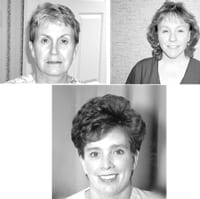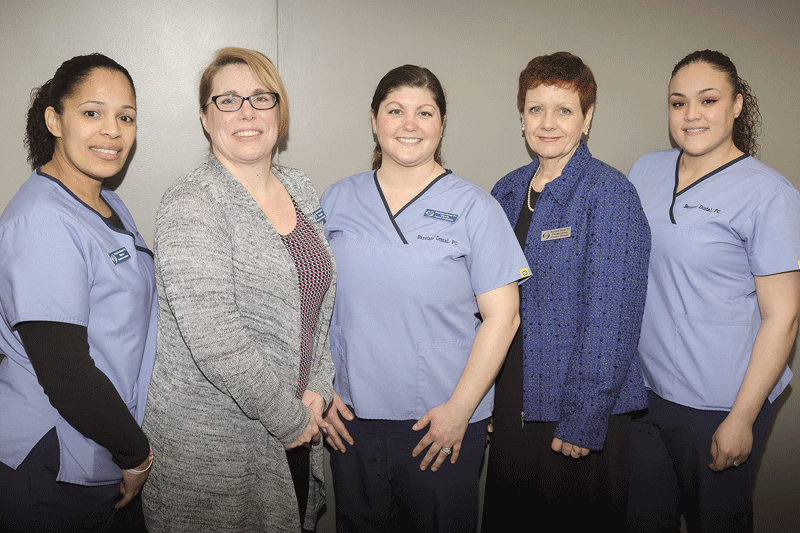Rhonda Fernandez ,Leslie Beaudin & Kathleen Herman
Rhonda Fernandez
Clinical One West Springfield
Position: An ICU and telemetry nurse with Clinical One, a staffing agency based in West Springfield; currently on assignment at Mercy Medical Center in Springfield after a lengthy stint at Cooley Dickinson Hospital in Northampton.
Education: Associate’s in Nursing from Western Connecticut State University (1994).
Favorite hobbies: “I have a one-year-old, so I don’t have much time for hobbies. I like to read and run, but everything now is definitely family-oriented.”
How she got into nursing: “I always wanted to be a nurse; it’s something I knew I was going to do — it just took me a while to get there. I always liked caring for people, and nursing seemed like a great opportunity for me to do that.”
Favorite aspect of the job: “I like the positive outcomes; I like seeing people get better. I know it doesn’t always work that way, but often it does, and I enjoy seeing people who were sick leave the hospital feeling better. I also enjoy working with the families of sick people … they need lots of caring, too. Nursing is certainly not easy work, but I find it enormously satisfying.”
Most challenging aspect of the work: “The acuity of patients is definitely more of a challenge today. People come to the hospital sicker than they did years ago. Also, the workload is a challenge — we have more to do than ever before. There’s a nursing shortage today — that’s where my job comes from — and it’s going to be with us for a while.
How has the industry changed? “Let’s start with technology — it’s constantly changing, and for the better, obviously. Everything is improving, but there’s a lot to learn, and that’s a challenge. Also, nurses have more responsibility today. Patients are sicker, and that puts more pressure on nurses.”
How would you improve nursing? “I’d hire more nurses — if there were some to hire. I’d get more people in here. If I were an administrator, I’d spend a lot of time talking to nurses, asking them what they need and how I could help them do their jobs better. As an agency nurse working nights, I don’t see many administrators. I see supervisors, but I don’t see the directors and the managers. To make nursing better, I think managers need to keep asking nurses what they need besides more nurses.”
Leslie Beaudin
Holyoke Hospital Holyoke
Position: Clinical coordinator, working on the surgical post-op floor.
Education: Holyoke Hospital Nursing School (1966).
How she got into nursing: “I always thought I would be a nurse … I was always leaning toward that profession. I’m a people person; I get a great deal of satisfaction out of helping people.”
Favorite aspect of the job: “On the floor I work on, most patients are surgical, and you can see them progress quickly. I like seeing patients get better. Another thing I like is the greater sense of teamwork between doctors and nurses today. When I started more than 35 years ago, nurses merely followed a doctor’s orders — they weren’t really allowed to think for themselves. Now, it’s much different. I think doctors respect nurses’ opinions much more than they did years ago.”
Most challenging aspect of the job: “I wear a lot of hats on my job … I’m at the bedside, but I’m also a manager. One of the biggest challenges I see today is dealing with the turnover in nursing. This department has a good retention rate, things are fairly stable, but overall, turnover is a much bigger problem today than it was years ago. Meanwhile, finding nurses today is a challenge, and when you find them, you have to retain them, and that’s also more difficult than it was. Also, there’s more stress in the job today. There’s more work to do and less time to do it in — and there’s a lot more paperwork to fill out.”
How has the industry changed? “Maybe the biggest change is in how quickly patients are processed; patients are here for a much shorter time. Years ago, people stayed in the hospital 10 days after having a gall bladder out; now, they often go home the same day. In nursing, things have changed, too. When I first graduated, a nurse’s scope was much more limited; now, we have our hands in many more things — there’s much more responsibility. And, like I said, doctors and nurses are much more of a team than they once were.”
How would you improve nursing? “I think I would try to allow for more flexibility. A lot of nurses today are looking for variety. Some would like to work 12-hour shifts three days a week and avoid five-day weeks so they can spend more time with their families. I think flexibility would be good, when possible, and just more communication between nurses and administrators so each side understands the other.”
Kathleen Herman
Pine Hill at Kimball Farms Lenox
Position: Director of health services at Pine Hill at Kimball Farms, a retirement/life care community.
Education: The former Pittsfield School of Practical Nursing (1971) and Berkshire Community College (1986).
Favorite Hobbies: “I have a summer cottage in Rhode Island, where I do a lot of sailing. I’m also an avid reader, and love babysitting for my grandchildren.”
How she got into nursing: “I can’t remember a time when I wanted to be anything but a nurse. I have a caring personality and wanted a career that allowed me to work with people. Nursing was a perfect fit. When I got of nursing school, jobs were very hard to find. I took a temporary position in a nursing home; I was supposed to stay six weeks, but wound up staying for 14 years.”
Favorite aspect of the job: “The work is very rewarding. I like how I can change and enhance someone’s life. In a setting like this, you can see how your work impacts people, and you can see the change in their personality — it makes your day.”
Most challenging aspect of the work: “One of the biggest challenges is keeping up with all the advances in technology. Another problem, of course, is the shortage of nurses. My daughter is a Navy nurse, based in Newport, and even in the military there are serious shortages of nurses. There are a lot of good programs going on to try to get people into nursing — Berkshire Medical Center has one — but more needs to be done. I think nurses have to get out there and talk with young people and get them interested.”
How has the industry changed? “The cost of everything has gone way up, and it’s created a situation where not everyone can get the care they want or need. Even here, you see some people struggle to pay for their prescriptions. The scary thing is what’s going to happen down the road — no one knows. What’s going to happen 10 years from now, when I’m retired?”
How would you improve nursing? “We have to keep working to provide a good working environment for nurses — we have to give them ownership in what they’re doing. That’s what we do here. My style is not to dictate, but to instead have people buy into what we’re doing and work together to solve something. I think that makes for a better working environment, and we need to see more that in health care today.”



Comments are closed.